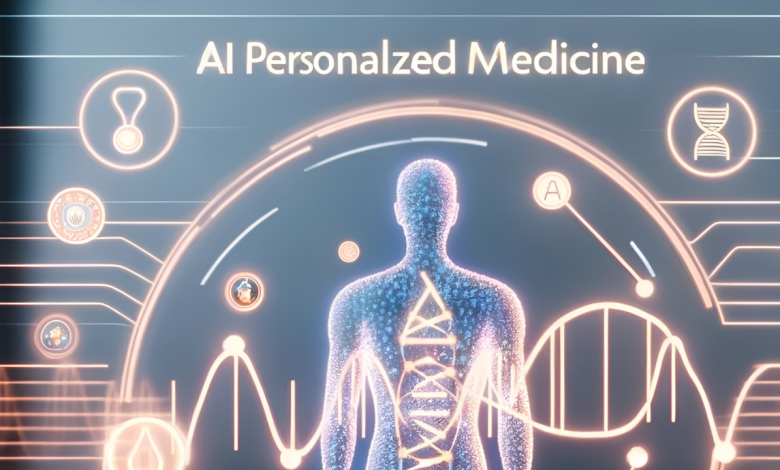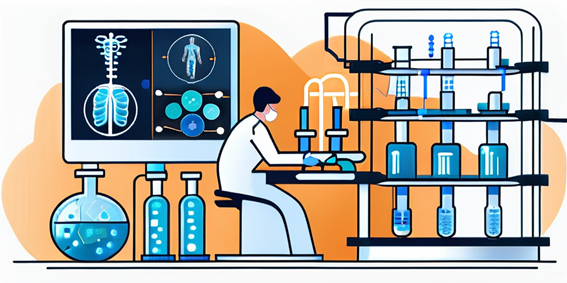AI’s Role in Personalized Medicine

AI’s Role in Personalized Medicine
Artificial Intelligence (AI) is revolutionizing many fields, and healthcare is no exception. One of the most promising applications of AI is in personalized medicine. This approach tailors medical treatment to the individual characteristics of each patient. In this article, we will explore how AI contributes to personalized medicine, its benefits, challenges, and future prospects.
1. What is Personalized Medicine?
Personalized medicine refers to customizing healthcare based on individual patient characteristics. This includes genetic information, lifestyle factors, and environmental influences. Instead of a one-size-fits-all approach, personalized medicine aims to provide more targeted treatments. AI plays a crucial role in analyzing complex data to make this possible.
2. The Data Revolution
The rise of big data has transformed healthcare. Medical professionals now have access to vast amounts of information. This includes electronic health records (EHRs), genomic data, and clinical trials. AI technologies can analyze this data quickly and accurately. By processing large datasets, AI can identify patterns and correlations that might not be visible to humans.
3. AI in Genomics
One of the key areas where AI is making an impact is genomics. Understanding a patient’s genetic makeup is essential for personalized medicine. AI algorithms can analyze genomic data to identify mutations and variations. This information helps in predicting disease susceptibility and treatment responses.
For example, in cancer treatment, genomic profiling can reveal specific mutations in a tumor. Based on this analysis, doctors can select targeted therapies that are more likely to be effective. This personalized approach improves patient outcomes and reduces the likelihood of adverse reactions.
4. Predictive Analytics
AI’s predictive analytics capabilities are transforming how we approach patient care. By analyzing historical health data, AI can forecast disease risks and outcomes. This allows healthcare providers to implement preventive measures early.
For instance, AI can identify patients at high risk for chronic diseases like diabetes or heart disease. By recognizing these risks, doctors can recommend lifestyle changes or early interventions. This proactive approach can significantly enhance patient health and reduce healthcare costs.
5. Improving Diagnosis
AI also plays a critical role in improving diagnostic accuracy. Traditional diagnostic methods can sometimes be subjective and prone to errors. However, AI algorithms can analyze medical images, lab results, and other data with high precision.
In radiology, for example, AI can assist in detecting anomalies in X-rays, MRIs, and CT scans. These algorithms are trained to recognize patterns that indicate diseases such as cancer or fractures. As a result, AI can support radiologists in making more accurate diagnoses.
6. Tailoring Treatment Plans
Once a diagnosis is made, personalized medicine uses AI to tailor treatment plans. By considering various patient factors, AI can help doctors select the most effective therapies. This approach minimizes trial-and-error methods that can delay recovery.
For example, in pharmacogenomics, AI analyzes how different patients respond to medications. By understanding genetic factors, doctors can prescribe drugs that are more likely to be effective for each individual. This not only enhances treatment efficacy but also reduces the risk of side effects.
7. Enhancing Drug Development
AI is also revolutionizing drug development. The traditional drug discovery process is often lengthy and expensive. However, AI can streamline this process by identifying potential drug candidates more efficiently.
Through machine learning, AI can analyze vast chemical databases to predict which compounds may have therapeutic effects. This accelerates the identification of promising drug candidates. Consequently, pharmaceutical companies can bring new treatments to market faster and at a lower cost.
8. Challenges of AI in Personalized Medicine
Despite the significant advantages, challenges remain in implementing AI in personalized medicine. One major concern is data privacy. As AI relies on large datasets, safeguarding patient information is crucial. Healthcare organizations must ensure that data is handled securely to protect patient confidentiality.
Another challenge is algorithmic bias. If the training data is not representative, AI algorithms may produce biased outcomes. For instance, a model trained predominantly on data from one demographic may not perform well for others. Addressing this bias is essential to ensure equitable healthcare for all patients.

9. Integration into Clinical Practice
Integrating AI into clinical practice poses additional challenges. Healthcare professionals need training to use AI tools effectively. Additionally, there may be resistance to adopting new technologies among some practitioners. Therefore, ongoing education and support are essential for successful integration.
Moreover, regulatory frameworks must evolve to accommodate AI technologies. As AI becomes more prevalent in healthcare, guidelines for its use will be necessary. These regulations should ensure that AI applications are safe, effective, and ethical.
10. The Future of Personalized Medicine
The future of personalized medicine looks promising with AI at its core. As technology advances, AI will become more sophisticated in analyzing patient data. This will enable even more precise tailoring of treatments.
Moreover, AI’s role in telemedicine is expanding. Remote monitoring and virtual consultations are becoming more common. AI can enhance these services by analyzing patient data in real time and providing insights during consultations.
11. Conclusion
AI’s role in personalized medicine is transformative. By leveraging advanced data analytics, AI enhances diagnostics, tailors treatment plans, and accelerates drug development. Although challenges such as data privacy and algorithmic bias exist, the potential benefits far outweigh the drawbacks.
As healthcare continues to evolve, the integration of AI will be crucial for delivering personalized care. By prioritizing patient-centered approaches, we can improve health outcomes and enhance the overall patient experience. The future of medicine is personalized, and AI will lead the way.
In summary, understanding AI’s role in personalized medicine is essential for harnessing its full potential. By embracing these advancements, we can create a healthcare system that is more effective, efficient, and equitable for all.




